10 tips for camping on a budget
Our tips for camping on a budget cover how to avoid fees, cut down on gear costs and save on meals for a more economically friendly approach to sleeping wild
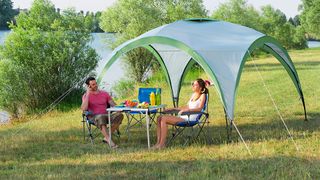
Compared to other types of travelling, camping is definitely one of the most cost-effective options out there. But by the time you gear up with everything you need, load up on food and fuel, then throw in campground fees, the bill for a few nights of what was supposed to be the simple life can be eye watering – and no, that’s not just campfire smoke getting in your eyes. Was camping always this expensive? The truth is that as camping gear has gotten more high-tech, and as camping has become more popular, the cost of camping has steadily risen, but that doesn’t mean you have to take out a second mortgage to sleep outdoors. Our top 10 tips for camping on a budget cover how to avoid camping fees, cut down on gear costs and save on meals for a more economically friendly approach to sleeping wild.
Just a note – these tips are best-suited for car camping, so if you’re hiking in to your destination, you'll want to jump over to our article on backpacking on a budget to find the best tips for you.
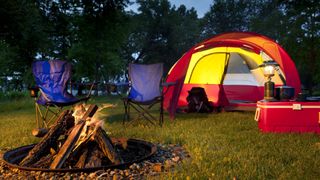
1. Avoid campsite fees
No, we’re not suggesting you poach spots in campgrounds, but if you camp regularly, one of the biggest ongoing expenses can be paying for campsite fees, even if they are substantially cheaper than hotels. In the US, you can camp on BLM land for free and in parts of the UK, you may be able to wild camp, though in some areas you’ll need permission from the landowner. Sure, you might forego some of the conveniences of developed campgrounds, such as picnic tables, fire rings and even toilets, but you can bring your own camping table, you’ll save money and probably enjoy much more peace and quiet while you’re doing it.
2. Camp during off-season
Like virtually any outdoor activity, there is a camping season during which campsite fees can be elevated. If you have the right gear – like a 4-season sleeping bag – you may be able to enjoy all the perks of frontcountry camping but save on permits and skip the crowds!
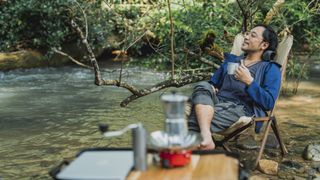
3. Plan your meals
Cooking your own meals is pretty much always more economical than any other option. Plan big camping meals that use low-cost but hearty ingredients like pasta, bean stews, rice and oatmeal that will generate leftovers, and avoid loads of packaged snacks and sandwich meats that can cost a pretty penny. Make sure you pack food for the journey too, as those service station stops can really add up.
4. Use the campfire for cooking
Though it’s not the easiest or most reliable cooking method, you can use the campfire for cooking and save on buying fuel for your camping stove. First, you’ll need to make sure that there isn’t a fire ban in place and that you’ll have access to firewood (see the next tip) and then you’ll want to plan meals that you can easily and safely cook in a campfire. It may be best to avoid thick cuts of meat and potatoes that can cook unevenly, and focus on meals that cook inside foil pouches and vegetarian meals or meals that use lots of canned foods which are cheap. You can use a dutch oven for tasty stews and casseroles, or bring a cast iron skillet or grill rack. Remember your oven mitts for safe handling!
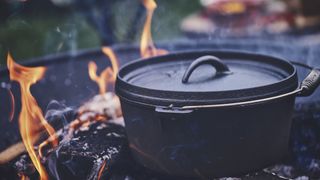
5. Bring or find your own firewood
Lots of campgrounds will sell you a nice, neat bundle of dry firewood, but it comes at a premium price. You can probably buy it much cheaper at the local grocery store before you set off, or better still, bring a camping axe or hatchet and learn how to chop firewood, for free.
Advnture Newsletter
All the latest inspiration, tips and guides to help you plan your next Advnture!
6. Consider a bivy and tarp system
If you don’t yet own a tent, and you’re only looking for something big enough for yourself, you can save a bit of money by purchasing a bivy sack and a tarp instead. This system is really for occasional use and best for fair weather camping, but it’s definitely a cost-saving possibility. Learn more about what you're getting yourself into with our comparison of one-person tents vs bivy sacks.
If you're feeling really gung-ho, you can even learn how to build a natural shelter!
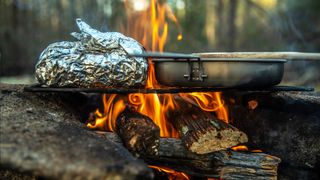
7. Shop the sales or second hand
This is our go-to advice for doing any outdoor activity on a budget, but since camping gear is so pricey, it’s probably one of the best things you can do. The cost of items like a tent, sleeping pad, sleeping bag and camping stove can all really add up, especially if you’re shopping for premium gear. With patience, you can wait until the fall, when camping season is considered over, Black Friday camping deals or January sales and pick up some great deals. For even deeper discounts, shop gently used gear which you can find online, from camping retailers and at thrift shops.
8. Rent or borrow gear
If you’re not an avid camper, there may be some big ticket items that just make sense to rent or borrow from a friend, rather than buy. Obvious items would be a tent, which is a higher cost piece of kit, but you can even rent a sleeping bag and use a sleeping bag liner with it if you’re worried about hygiene. Lots of gear hire places do camping kits where you can pay a single rental fee for a tent, sleeping pad and bag plus a lantern and stove which takes all the hassle out of haggling over individual pieces of gear.
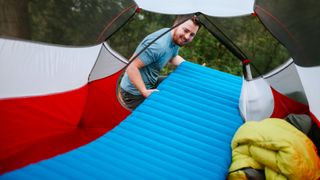
9. Avoid disposable items
Where possible, avoid items that are disposable, such as polystyrene camping coolers, single-use barbeque grills, paper plates and plastic cups. The sticker price on these might look cheaper than buying camping gear, but per use, you’ll end up paying more in the long run, never mind the environmental implications.
10. Use household items as camping gear
Look around your house for items that you already own that you can take camping. You don’t necessarily need a full set of camping-specific items – old pots and pans, silverware and plates can just become your camping kitchenware. Gym mats can double up as sleeping pad alternatives and seats, You may even be able to bring your own bedding, if it’s warm enough, and avoid forking out for a sleeping bag and camping pillow. If you plan ahead, you can be making ice all week and storing it in plastic containers in your freezer, ready to pour into your camping cooler on the day.
Julia Clarke is a staff writer for Advnture.com and the author of the book Restorative Yoga for Beginners. She loves to explore mountains on foot, bike, skis and belay and then recover on the the yoga mat. Julia graduated with a degree in journalism in 2004 and spent eight years working as a radio presenter in Kansas City, Vermont, Boston and New York City before discovering the joys of the Rocky Mountains. She then detoured west to Colorado and enjoyed 11 years teaching yoga in Vail before returning to her hometown of Glasgow, Scotland in 2020 to focus on family and writing.

